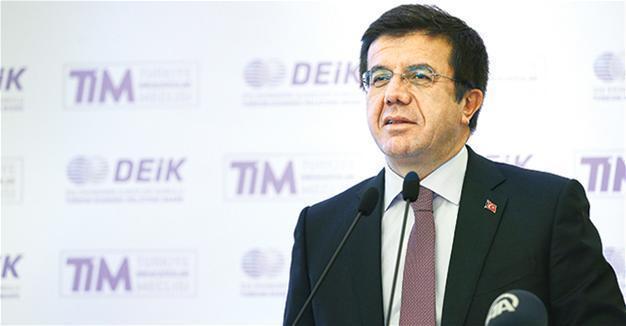Update in Customs Union deal to transform Turkey’s agricultural sector: Minister
ANKARA

AA photo
Turkey’s agricultural sector will see a considerable and positive transformation after the country’s Customs Union deal with the European Union is updated, said Economy Minister Nihat Zeybekci.The sector will be the most challenging one in a profound update of the Customs Union based on their impact analyses, he said.
“There are huge differences between the agricultural policies of the EU and Turkey. We have been protecting the sector, farmers and agricultural products by building high customs walls. Consumers pay high higher costs due to high customs taxes. In this way, they pay 40-50 Turkish Liras for a kilogram of meat, instead of paying half. This is the case for almost all agricultural products. I cannot say this is wrong, but I can say that the EU applies a different way. The EU opens its markets so as to enable its people to consume at lower costs. It grants direct subsidies from its budget to meat, milk, eggs or other agricultural products. When our Customs Union deal with the EU is modernized, we will see a huge transformation in our agricultural sector,” he said, as quoted by Anadolu Agency on Jan. 15.
Zeybekci noted that both the EU and Turkey benefited a lot from the existing deal, but Turkey has been uncomfortable as it does not hold a position on the decision-making mechanism.
The European Commission said Dec. 21, 2016, that it asked the European Council for a mandate to launch talks with Turkey to modernize the existing EU-Turkey Customs Union. The upgrade of the EU-Turkey trade relation forms an essential part of the efforts made by the EU and Turkey to deepen their relations in key areas of joint interest identified at the EU-Turkey Summit of Nov. 29, 2015, and in the EU-Turkey statement of March 18, 2016.
‘Considerably positive’ step
“This as a considerably positive development,” said Zeybekci, adding that the both sides made independent impact analyses on the road to modernizing the existing deal, which covers only industrial goods trade.
“We find the results positive for both sides … The first alternative includes updating the existing Customs Union deal, including in the service and public procurement sectors, yet with only 50 percent of expansion in the agriculture sector. If this scenario is realized, there will be a roughly 1 percent increase in Turkey’s GDP. While the EU’s exports to Turkey will also increase 30 percent, Turkey’s exports to the EU will see a roughly 23 percent increase,” he said.
“The second alternative includes the complete modernization of the deal in all fields, including agriculture, services and public procurement acquisitions. The best alternative for us is the second alternative,” added the minister.
The modernization of the Customs Union deal with the EU will increase Turkey’s gross domestic product by 2 percent by 2030 in this best-case scenario, according to Zeybekci.
“The third alternative stipulates the conversion of the Customs Union deal into a comprehensive free trade agreement in only the industrial sector, with both parties having the right to determine separate customs tariffs for each product. This is a failure scenario for us,” he said.
The fourth alternative will require the signature of free trade deals in all sectors, again without offering Turkey a right to a say in decision-making mechanisms,” added Zeybekci.
















